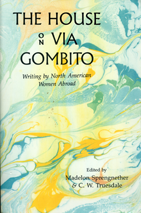For years I didn’t want to acknowledge that I’m a quarter German. Had I ever been to Germany? No. But I knew my mother’s dictatorial tendencies. These two words–dictatorial tendencies–cancel each other out, I know, but perhaps they should because she wasn’t always a dictator. Until my sister and I reached our teens, our mother kept us excellently entertained. She established the kitchen at The Old Citadel as a little art colony with water colors strewn over the kitchen table. In a box under her ironing board lodged pink and blue Easter chicks bought at Woolworths. Our Christmas gifts were either artistic, educational or both. When she had occasional ladies tea parties, we helped her make “blue moon” sandwiches out of tinted cream cheese. In spare moments my sister and I danced to the Sugar Plum Fairy, wearing Thrift Store dresses. Finally by evening, exhausted by all these escapades, not to mention keeping up with the 150 children in the block-long Old Citadel, we sank down on either side of her as she read to us–the Laura Ingalls Wilder “Little House” books were a favorite. She’d grown up in North Dakota. She knew prairie and blizzards, which to us in the warmth and humidity of Charleston, South Carolina, seemed exotic and entirely far away.
Calling her dictatorial and labeling that behavior German was my father’s doing. Their kitchen wars (bedroom, too, for all I know) revolved around getting him out the door to teach every morning at The Citadel. He was disorganized. He had what she called the dithers. With his Italian operatic excesses of gesture and voice, he acted out his injured rage at the sharp disgust in her voice: “Oh, Leonard, they’re just where you left them!” I.e., his glasses, or briefcase, or Citadel hat. “Oh, Leonard, you’ve made it worse!” I.e., he’d sponged at a spot on his uniform with a bit of soap and water, spreading the stain across his middle. In a fury of anxiety, he pulled off the shirt while she heated up the iron to smooth out the damage.
Finally when I left home for college, then marriage, then a move to Minnesota, she couldn’t keep her mitts off the spots I was making worse. Her voice on the phone truly did dictate what choice I should make–my daughter’s schooling, the linoleum for the kitchen, the second-hand car we were buying. She had opinions and directives about them all. I learned to cringe at the sound of her voice.
Couple that with the fact that my first husband was German-American too, and we were spiraling down into divorce–and you have the essence of my dislike for the Fuehrerland. Then my daughter began to study Germany in middle-school and traveled there several times. “Mom, you don’t know what you’re talking about. Germany is delightful–clean, beautiful, charming.” Photos of her with the Munich marble municipal lions showed their mutual classy elan.
By this time I was aware that being German wasn’t merely a tendency acted out in an overheated American kitchen. Hitler’s rampage across Europe had torn apart civility and civilization. In death camps for Jews and other “deviants” his police perpetrated a genocide never before matched for cold insistent cruelty. Now I began to admit that as part German, I carried a weight of second-hand guilt. If I was going to visit Germany, I had to acknowledge it, and try in part to expiate it.


Leave a Reply